How to Raise Kids With No Punishments
15 min read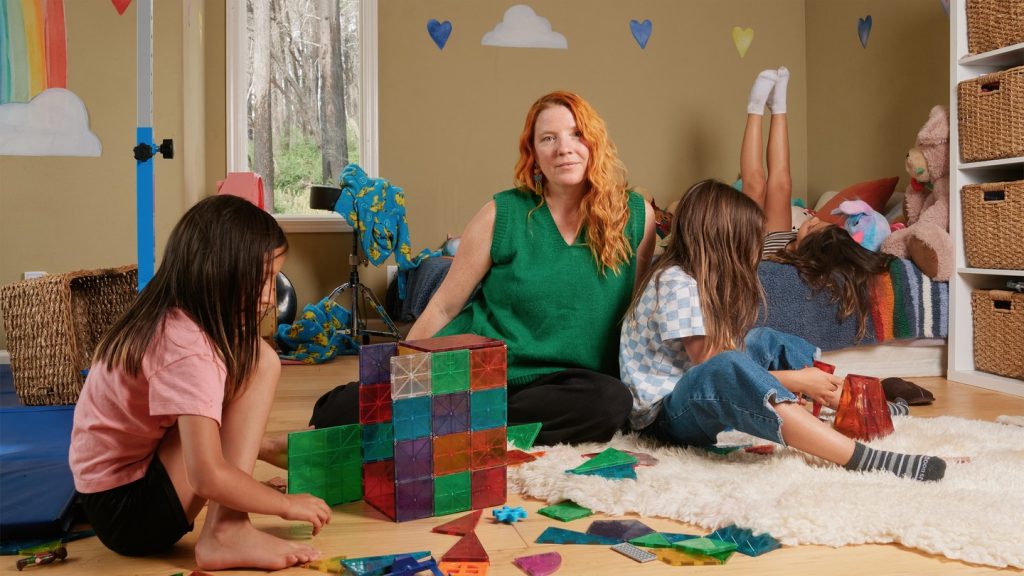
The kids held it together pretty well until right after gymnastics. At the end of a long day that included school, a chaotic playdate, and a mostly ignored lunch of sandwiches, the parenting coach Chelsey Hauge-Zavaleta picked up her twins from the tumbling gym around 5:30. The two 8-year-olds joined their 6-year-old sister inside Chelsey’s silver minivan.
Chelsey, an energetic 41-year-old, promotes gentle parenting, a philosophy in which prioritizing a good relationship with your kid trumps getting them to obey you. I was tagging along with her family for a few days to see how her strategy—stay calm, name emotions, don’t punish kids for acting out—works in practice.
During the long, hot, winding ride back home, things began to devolve. One of the girls didn’t want any music. One wanted music and to sing along. One was turning the heater up too high—at least according to her sister, who was overheating. (I agreed not to name the kids or to disclose which one behaved in which way.)
Chelsey pulled over to settle everyone down. In the soothing, melodic tone that she recommends parents use with their children, she assured the girls that having some dinner would make them feel a lot better.
“No it won’t,” one of the girls said.
“You’re feeling like it won’t,” Chelsey said, validating her daughter’s feelings—another one of her parenting tricks.
“Don’t talk to me like I’m 3 years old,” the girl shot back.
By the time they arrived home, two girls were in tears. There were fruitless demands for screen time and ice cream. Chelsey held one sobbing child while another chopped vegetables. A freshly prepared soup was ignored, and the girls ate that ubiquitous kid comfort food: pasta with shredded cheese.
To an untrained eye, it might look like Chelsey’s methods didn’t work that night. The evening seemed to substantiate the fears of parents and experts who think gentle parenting might be too gentle, turning kids into entitled monarchs and parents into their exhausted therapists. But Chelsey says her goal wasn’t to get the kids to behave better. It was to maintain her loving connection to them. She blamed herself for placing too many demands on them throughout the day, and for not preparing them for the presence of a reporter. “They were super dysregulated,” she told me later. “They didn’t have the capacity to cooperate.”
I wouldn’t have handled the post-gymnastics meltdown exactly the way Chelsey did, but I’m also not sure how I would have handled it at all. (My son is six months old, so I have a little time before he starts complaining about my song choices.) I understand that you’re not supposed to yell at your kids, but also that, occasionally, you’re supposed to get them to do what you say—like briefly stop looking at a screen or eat some actual food. This is the essential conundrum that brings people to gentle parenting.
By day, Chelsey runs a parent-coaching business with her own mom, Robin Hauge. I’m like a lot of the parents who turn to them for help, and like a lot of the Millennials who are nervously having kids these days: schooled in the latest child-psychology research, in possession of disposable income, and desperately trying to do better than my own parents. Many clients, Robin told me, are “searching for something different than they had.” Maybe that something, I thought, is gentle parenting.
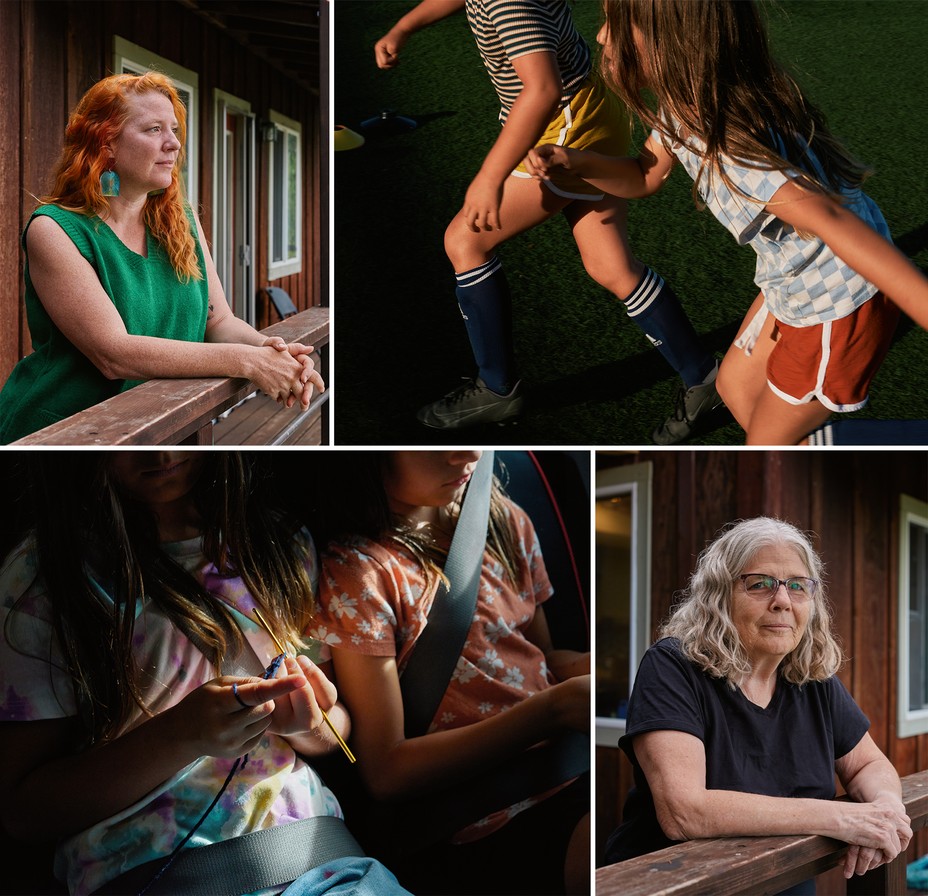
I found Chelsey through TikTok, where she has some 300,000 followers. Almost as soon as the blue plus sign materialized on my pregnancy test last July, the app’s algorithm magically took note and began serving me her videos.
My husband and I spurred this process along, cramming, as we were, for the midterm known as “baby.” We bought books. We downloaded name apps. We fought sectarian wars over the relative correctness of rival infant-sleep strategies. The parenting internet was happy to oblige. At one point, I saw an Instagram post that explained how to talk to my kid about avocados. (Hint: Do not say “they’re good for you!”) It was all so confusing, and I desperately wanted to do it right.
Chelsey seemed to offer a step-by-step parenting plan. In one video, she shows just how solicitous gentle parents should be toward their children. Role-playing both the parent and the child, she demonstrated what not to do when your kid refuses to put her jacket on.
Wearing a pink bike helmet, Chelsey portrays a willful child screaming, “I don’t want to put my stupid jacket on!” Then, slightly louder, Chelsey plays the mom, saying, “I don’t care! It’s cold outside. Put your jacket on!” Playing the child again, Chelsey grabs the jacket and thrashes it around the room.
Then Chelsey breaks character to address her TikTok audience. By yelling over her child, Chelsey explains, she escalated the situation. If this happens, she says, the parent should soften her demeanor. They could, for example, apologize. “You know what, sweet pea? That was really tricky with the jacket,” the parent should say. “I’m so sorry … I’m going to work on using my inside voice.” Then she could cook her kid’s favorite dinner to make up for it. If your child doesn’t respond when you apologize, Chelsey says, that’s fine—it’s on you to repair the relationship.
Chelsey also explains how a parent should handle a child screaming about her jacket. Instead of yelling back, she says, you should speak in a whisper and carry the jacket yourself, or stuff it into their backpack. “Frankly,” she says, “I would not force a kid to put a jacket on.”
Watching the video, I tried to imagine my parents apologizing to me after I refused to do something they said. This was difficult, because my parents have never apologized to me, and also, until I was well into my 20s, I never refused to do anything they said.
Russian parents like mine, who believe that children should always listen to their parents and that getting cold is a death sentence, would have long ago hit “Unfollow.” Indeed, when I recently told my cousin about gentle parenting, he scoffed. “This is the road to prison,” he said.
I don’t have many parenting role models who aren’t Russian. Most of my American friends don’t have kids. I myself grew up in the ’90s in West Texas, where a “gentle” punishment meant detention instead of a beating. I want to do better by my son—if only I can figure out how.
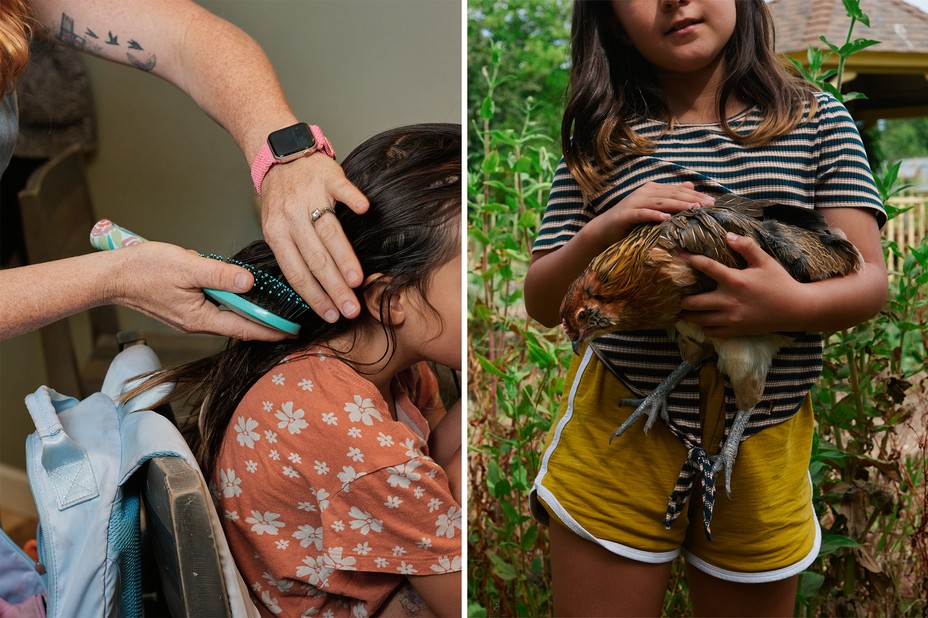
Chelsey and her husband, Samuel, live with the girls in an airy house tucked into a redwood forest north of Santa Cruz, California. Their days consist of work-from-home sprints interrupted by taxiing their kids to school and activities, a lifestyle that’s common in their area.
In 2018, Chelsey, who has a Ph.D. in education, was working as a research associate at Stanford, parenting three children under 3, and also helping raise her teenage niece, who had come from Mexico to stay with the family for a while. By her own description, she was flailing. One morning, all three of the little girls fought over the one purple spoon in a set of rainbow-colored spoons. Chelsey tried suggesting the yellow spoon, or the red spoon, or that they take turns with the purple spoon. No dice. “It was like, everybody all crying all the time,” she told me.
Noticing her struggles, Robin, Chelsey’s mom, who runs a school for children with behavioral problems, thought Chelsey might benefit from taking a parenting class she offered, in which she taught parents how to handle challenging children. Perhaps sensing how such a proposal would land with her own adult daughter, she had Chelsey’s cousin bring up the idea. “You can’t suggest anything to your daughter,” Robin told me.
Chelsey was skeptical. But she now says the course “changed everything.” Previously, she had tried to learn about gentle parenting—which is also sometimes called respectful parenting, and arose in the middle of the 20th century out of concerns that parents were too harsh—from reading books, but she didn’t understand how to put the ideas into practice. The class made Chelsey realize that she was speaking to her kids negatively much of the time—stop hitting your sister! Often, what the kids needed was not more instructions but what she calls “connection,” or feeling loved and seen by their parents. (The correct way to resolve the spoon fight, Chelsey says, was to validate each child’s reality, saying something like “You really wanted the purple spoon. The orange spoon doesn’t taste good.” The child might still pout, but that’s okay.)
Chelsey and Robin both say that Chelsey and her brother were parented gently—Robin never yelled, for instance. But there was a difference between experiencing gentle parenting herself and seeing how it could apply to her own kids.
After the class was over, Robin never said “I told you so.” That’s something “you never do as a mother,” she told me. One of Robin’s first recommendations is to rid your interactions with your child of these types of “zingers.” They feel like an “eff you,” she said. (I always thought that was the point.)
Chelsey left her job at Stanford to help her mother teach a course called Guiding Cooperation. Together, they grew that course into a business. They charge a fee that starts at $5,000 per family for a 12-week parenting program that includes video lessons along with group and individual coaching. At any given time, the program includes about 40 to 50 families, they said, whose kids typically range in age from 2 to 13.
In one Zoom group-coaching session I observed, Chelsey asked her parent-clients to close their eyes and imagine sitting at a table with all the materials they’d need to work on a beloved project. “Around the table are all of the people that are the perfectly right people to do this project with,” she said softly. “Maybe you’re creating; maybe there’s bowls of yarn, or computers, laptops.”
Then, suddenly, she started clapping loudly. “Get the laptops, get everything! There’s a giant fire! Take that out of the room!” she yelled.
Chelsey asked the parents how that felt. They said alarming, panicky, and angry. Chelsey explained that many children are in this state when parents try to transition them from one activity to another too quickly. “The same body sensations happen for our kids,” she explained.
This is a recurring theme of Chelsey and Robin’s advice—that kids have many of the same emotions adults do. When they’re overwhelmed, they sometimes cry and scream. Don’t you? When punished, they don’t think about what they’ve done; they stew.
The goal of their programs is to decrease tantrums, but not through punishments or even rewards like sticker charts (too transactional, and kids often stop caring about the stickers). Chelsey says she has never given her girls a time-out. Rather than compliance, Chelsey and Robin seek cooperation—meaning the child does what you say because they want to do it. “I don’t even use the word obey or disobey,” Robin told me.
Instead of ordering kids to stop doing something, Chelsey advocates “positive opposites”—telling kids what they can do instead. Don’t instruct them not to jump on the couch; tell them to jump on the trampoline.

Praise for good behavior is a part of Chelsey’s philosophy, but she warns that this, too, requires care. Many parents go with “good job,” for instance. But Chelsey argues that this is confusing, because children don’t have jobs. Instead, she suggests commenting on specific things children do well, such as “You came down to dinner on time! Cool!” and “You’re sitting next to your sister keeping your hands on your own body? That’s awesome!”
During transitions, she recommends talking to younger kids in a sing-songy voice and in a kind of broken English: Okay, water bottle in backpack, now we’re walking to car. She says it’s easier for kids to process information this way. Chelsey and Robin suggest trying these strategies three to five times before switching tactics if they don’t seem to be working.
Psychologists I interviewed said that some of these strategies are evidence-based and effective. Most kids respond well to praise, for example, and tactics like singing and offering alternatives can make it more fun for kids to do what they’re told. However, they argue that consequences are also important, and that showering kids with positive attention when they misbehave can backfire. Time-out, in particular, has been proved to change behavior and improve academic performance, says Corey Lieneman, a clinical child psychologist at the University of Nebraska who co-wrote a book about time-out. For older kids, she told me, taking away privileges such as video games is effective—and is, in a way, a form of time-out. Lieneman also said there’s nothing wrong with using rewards, because “no little kid is going to just want to do all of the things that we want them to do.”
Chelsey and Robin admit that their method can be difficult, but they argue that this is just how much effort it takes to be a parent—especially when you have strong-willed kids. They push back on the typical reassurance that all a parent really needs is to be “good enough”—the early-child psychologist D. W. Winnicott’s notion that a parent need not be perfect, but “ordinary devoted.” “Good-enough parenting is not actually good enough for all children,” Chelsey says in another TikTok video. If you have a more challenging child, she says, “you’re gonna have to be more intentional, you’re gonna have to be more careful with your language, you’re gonna have to spend more time co-regulating. And honestly, what a gift that is, to have a child who demands more.”
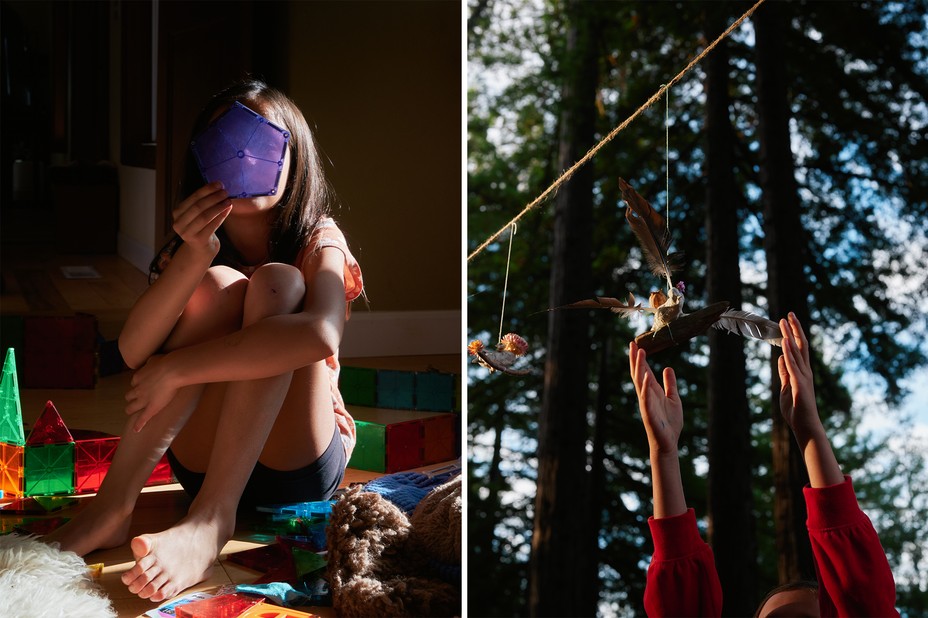
There’s no way to objectively measure Chelsey’s success. She and her mom say that no one has ever asked for their money back, and that most parents see good results.
But some parents may struggle to raise their kids this way. For one thing, although Chelsey argues that you would feel less busy if you yelled at your kids less, some parents work so much that there’s no time to prepare a special apology dinner. The U.S. surgeon general recently deemed parental stress a public-health concern, in part because of the sheer amount of time this kind of intensive parenting requires.
I spoke with one mom, Katerina, who hasn’t taken Chelsey’s class but who learned about gentle parenting through her own reading. (She asked to go by her first name only because she has a public-facing role at work.) For a while, she said, she tried to be an ultra-gentle parent with her two girls, but she found it hard to find time to validate all of their feelings and still get dinner on the table. “It requires a certain level of commitment and capacity that I think most moms don’t have,” she told me. She ultimately landed on trying to talk through her kids’ feelings most of the time, but also sometimes using rewards and consequences, such as taking away her 9-year-old’s chocolate for lying. “She accepted her fate,” she told me.
And although children’s emotions are obviously important, some parenting researchers feel that gentle parenting doesn’t sufficiently emphasize how kids’ actions can affect other people. What if, in refusing to put her jacket on, the child made her sister late for school too? (Robin and Chelsey counter that they are teaching kids how to be empathetic by modeling empathy toward them.) “Societies all around the world also focus on how your actions and your words affect other people’s feelings,” Michaeleen Doucleff, an NPR science correspondent and the author of Hunt, Gather, Parent: What Ancient Cultures Can Teach Us About the Lost Art of Raising Happy, Helpful Little Humans, told me. Some gentle-parenting experts promote empathizing with kids by saying things like I know, it’s so hard to share. “Well, is it? Is it hard to share?” Doucleff said. Do you actually want your kid to think that?
Rebecah Freeling, another Bay Area parenting coach, who specializes in kids with behavioral problems, says that gentle parenting can leave some parents struggling to set boundaries. What happens if you’re validating feelings and heaping on praise, but your kid still does drugs behind your back?
Chelsey says kids should never be punished, other than through occasional “natural and logical consequences”—like if a child throws and breaks the TV remote and it will no longer turn on the TV. Even something egregious, such as a teenager skipping school, Chelsey says should be handled by trying to determine, “What is going on at school, that you are not going?”
The most obvious problem with this approach is that it doesn’t adequately prepare children for the real world, where a boss is less likely to ask “What is going on at work, that you are not going?” than she is to fire you if you don’t show up.
But children, Chelsey counters, “are going to learn to be responsible adults when their nervous systems are honored.” She also seems to have a rather rosy view of corporate America: If you’re failing at work, “I hope your boss is supporting you to get back to a place of regulation so that you can do the work.”
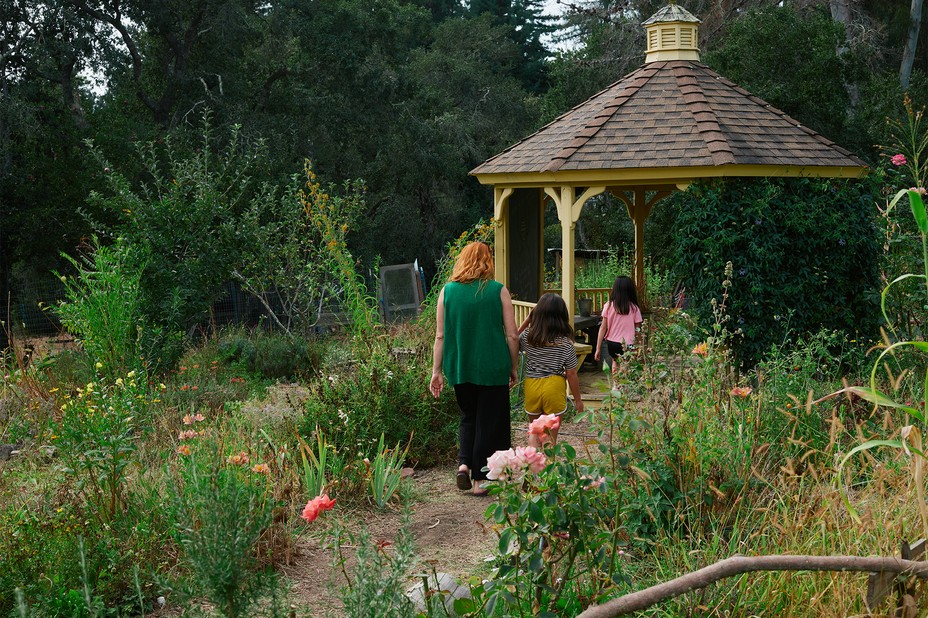
In Freeling’s view, however, it’s acceptable for a teen to, say, lose a preordained amount of screen time if they won’t fulfill basic responsibilities. Some parents who have tried gentle parenting come to Freeling saying that they feel bullied by their kids, or like they can’t ever say no. Some, Freeling said, sound like they’re describing an abusive relationship with a spouse: I do everything he asks, and he’s still hitting me.
Sometimes, even connecting with your kid can start to feel transactional—I’m connecting. Why aren’t you listening? One mother told Freeling that after she stopped trying to apply gentle parenting, “she could now free herself from the belief that she wasn’t loving her child right.”
When I asked Robin if people have trouble remembering the techniques she and Chelsey teach, she said, “One hundred percent.” Indeed, their tactics seem hard to recall, and to execute, when everyone is tired and hungry and preoccupied—so much so that even Chelsey sometimes deviates from her own advice. She says she doesn’t make her kids share, but when I was with them, one of the girls tried to call dibs on a bag of potato chips, and Chelsey told her to give some to her sisters. When one of the girls began eating cantaloupe with a ladle, Chelsey told her, “Not for eating, honey,” which is not a positive opposite. “It would have been stronger had I said, ‘We eat with a spoon,’” she acknowledged later.
After a few days with Chelsey and Robin, though, I came around to the view that their work is more than just a series of expensive scripts that you’ll strain to remember mid-meltdown. I realized that sometimes the point of this kind of program is to be not a permanent cure but a kind of ongoing emotional support. Watching Chelsey’s group-coaching sessions, I noticed that many parents seemed worried they were the only ones who couldn’t get their kids to behave. One mom, whose child had ripped something off the wall on the way out of preschool, said she feels “shame around the perceived idea that I can’t control my kid.”
As dozens of people have already warned me, parenting is the “hardest job you’ll ever have,” and I got the sense that, for her clients and TikTok followers, Chelsey is shouldering some of this intensely personal toil. There is something about Chelsey that makes people feel like it’s all going to be okay—you’re going to do better than your parents, but you’ll also mess up a lot, and that’s normal.
“In the ’90s, gentle parenting was, like, smacking your kid with the spoon instead of your hand,” said Mary Brock, one of the parents on the call. Later, she told me she likes how Chelsey and Robin listen to her, and give her encouragement without judgment. “I wish I had a gentle parent,” Brock added. “That’s what this class does for me.”
Chelsey often says that the first step to calming your kids is to calm yourself. Maybe gentle parenting, then, is less about soothing kids than it is about soothing their parents.



